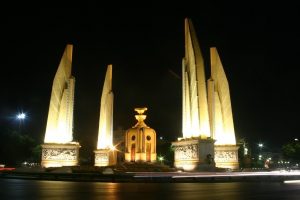Thai student protesters will tomorrow lead another mass demonstration in Bangkok, the latest in a line of protests challenging Thailand’s wealthy and entrenched royalist elite.
More than 30 pro-democracy groups from around the country are set to attend the demonstration, and organizers expect up to 100,000 people to attend, around twice as many participants as a protest last month.
Thailand has seen a rising protest movement since the court-ordered dissolution of the Future Forward Party, which came in third place at the country’s last election in opposition to Prime Minister Prayut Chan-o-cha.
The wave of protests has also been driven by the economic downturn that has accompanied the COVID-19 pandemic in Thailand. According to the World Bank’s latest economic outlook, Thailand’s highly unequal economy is expected to contract by as much as 10.4 percent in 2020, compared to a contraction of 7.6 percent in 1998, the year after the Asian financial crisis.
At a press briefing last week, the pro-democracy group Free People announced that the October 14 demonstration would take place at the Democracy Monument, which was built to commemorate the 1932 Revolution that ended Thailand’s absolute monarchy and introduced the country’s first constitution.
Protest leaders have several demands. First off, they want the resignation of Prayut, a general who led the country’s last coup d’etat in 2014 and then pasted together a wobbly election in scraped through a flawed election in March 2019. They also want an end to the harassment of Thai dissidents, who have been arrested, abducted and murdered since the 2014 coup.
Most controversially, they want reforms of the Thai monarchy, demanding that the power of the institution be subordinated to a new and genuinely democratic constitution. This call is politically explosive in Thailand, where the monarchy provides symbolic legitimation for the country’s lopsided distributions of power and wealth. This establishment is protected from public scrutiny by a harsh lese-majeste law criminalizes criticisms of the king or the royal family.
The recent protests have evinced an increasing irreverence for a once-hallowed institution, whose luster has dimmed following the accession for King Maha Vajiralongkorn, who took the throne following the death of his father Bhumibol Adulyadej in 2016. On October 13, the fourth anniversary of King Bhumibol’s death, some Thai twitter users posted commemorative messages that replaced photos of the king with that of a K-pop star.
In their press conference last week, the protest leaders vowed to keep up their pressure for the resignation of the government and the reform of the monarchy. “People who want any or all of these changes should join the movement,” said Arnon Nampa, a human rights lawyer and leading figure in the protest campaign. “We’re looking to increase pressure on the government.”
As so often in Thailand, the date of the protest carries symbolic weight: October 14 will be the 47th anniversary of the 1973 student-led uprising that culminated in the downfall of the military government of Field Marshal Thanom Kittikachorn.
The last major demonstration on September 19-20 saw around 50,000 people pour into the campus of Thammasat University and the adjacent Sanam Luang, a former royal cremation ground which faces onto the Grand Palace on the Chao Phraya River. There, activists cemented into the ground a plaque inscribed with the words, “At this place the people have expressed their will: that this country belongs to the people and is not the property of the monarch as they have deceived us.”
The plaque was designed to replace a plaque commemorating the 1932 revolution that disappeared one night in April 2017 – just one of a number of monuments to the revolution have been demolished in recent years. It, too, was promptly removed by the authorities.
The government and military have allowed the recent protests to go ahead, but the Prayut administration has shown little intention of compromise. On October 12, the Thai leader essentially blamed the protesters for Thailand’s economic malaise, arguing that in order for the economy to recover, the country must “be peaceful,” arguing that the months of anti-government protests were “unnecessary” and counter-productive.
This came after the new chief of the Royal Thai Army warned student protesters about pushing their demands too far. “They should look at themselves first to see whether they have done everything right before telling others what to do,” said army commander General Narongphan Jitkaewtae, who acceded to the top job at the start of the month.
Narongphan said four things in his view had to be protected: the nation, Buddhism, the king and the Thai people. He pledge to “do whatever it takes to ensure that security.” Given the military’s track record of using force to quell popular demands for change, it is a warning that Thailand’s burgeoning protest movement should take seriously.

































